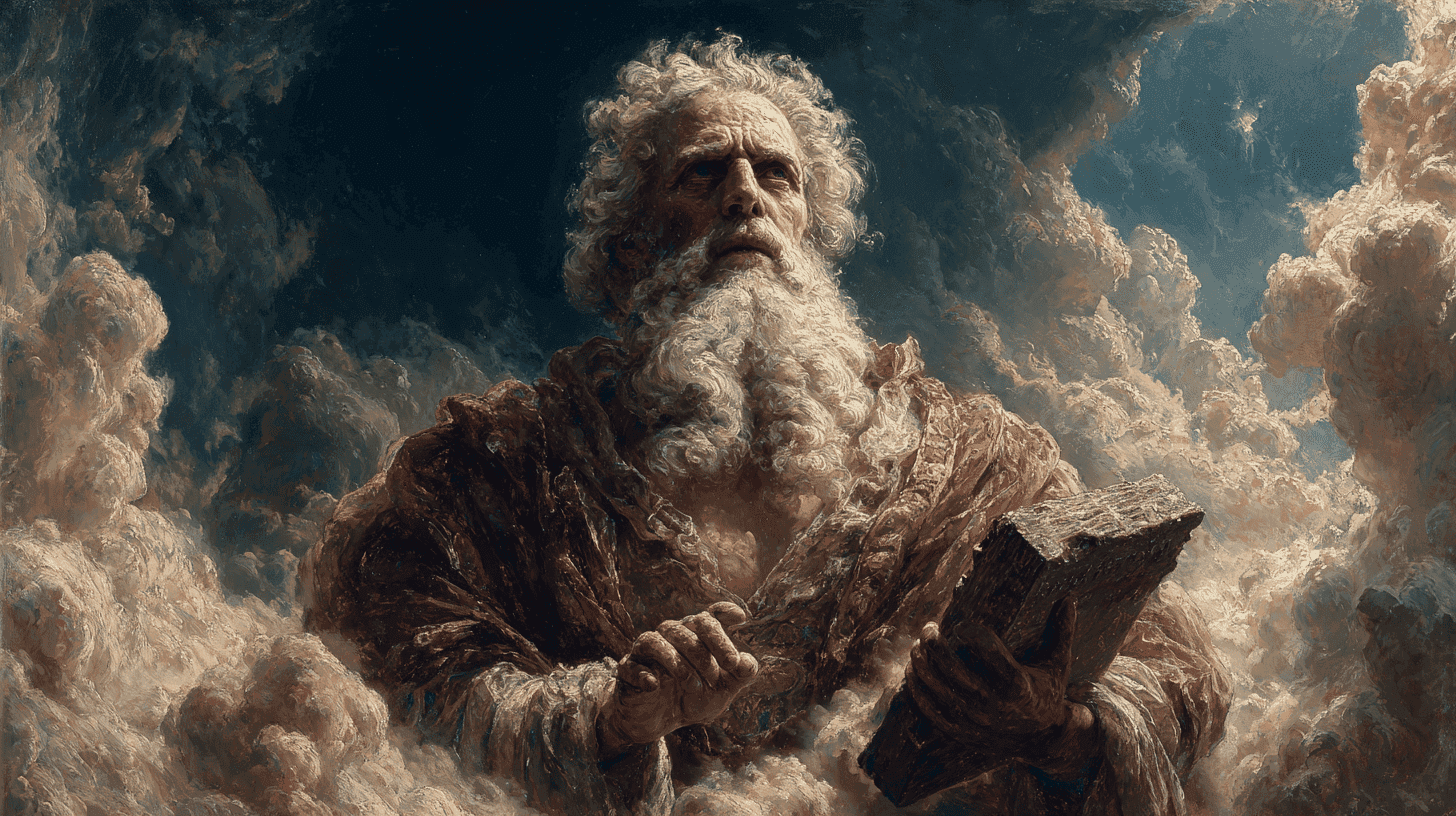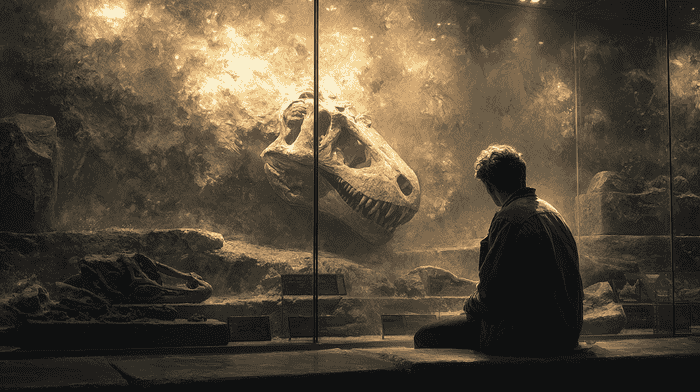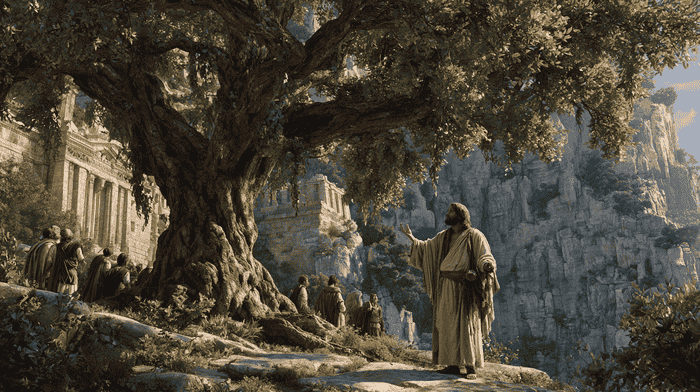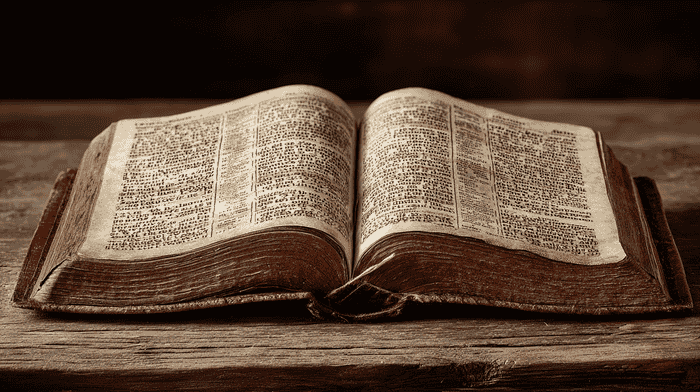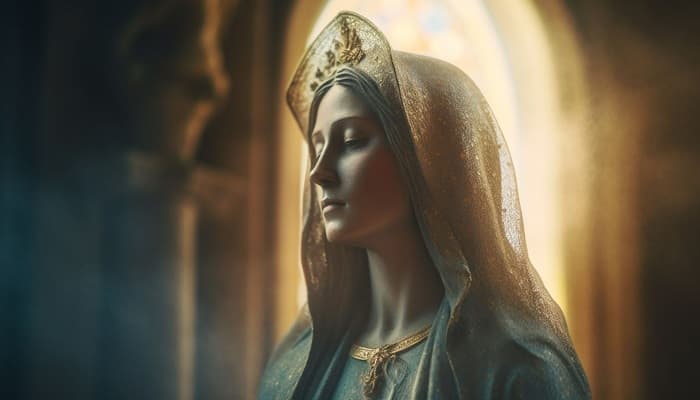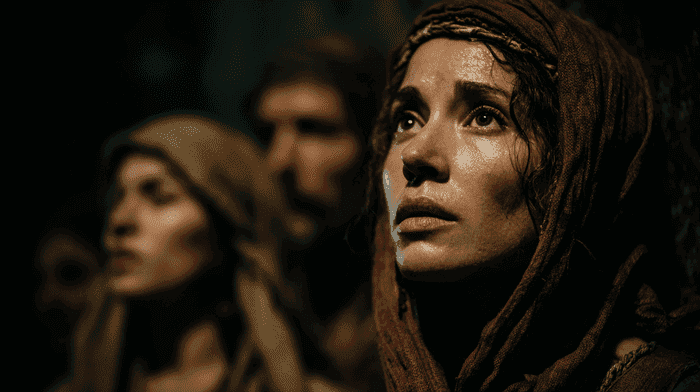Moses’ Early Life: From River to Royalty
Moses was born in a time of great persecution towards the Israelites. As a consequence of their growing population, the Egyptian Pharaoh suspected the Hebrew slaves might ally with the enemies of the country.
As a solution and a way to control through fear, the Pharaoh ordered that all Hebrew sons should be killed (Exodus 1:22 NRSVCE). It's in this tense context that Moses is brought to life, but through a series of divine circumstances, he will make it.
His mother, Jochebed, made an unthinkable choice: she hid him as long as she could, and when it became too risky, she placed him in a basket, sealed it with pitch, and set it adrift among the reeds of the Nile (Exodus 2:3 NRSVCE).
It’s a moment that’s both desperate and full of faith. You can almost imagine her heart breaking as she let go, not knowing whether she was sending him to safety or his death. But God was already at work.
The baby was found by none other than Pharaoh’s daughter, who took compassion on him. She decided to raise him as her own, and in another act of quiet providence, Moses’ mother was chosen to nurse him in his earliest years (Exodus 2:5-10 NRSVCE).
Moses grew up with the best education and privileges Egypt could offer. Acts 7:22 (NRSVCE) says he was “instructed in all the wisdom of the Egyptians” and became “powerful in his words and deeds.”
But there was always a tension underneath. He was living in Pharaoh’s palace, yet he knew he was Hebrew. He didn’t fully belong to either world. That sense of being caught between two identities (prince and outsider, Egyptian and Israelite) would shape the rest of his life.
Even in this beginning, we see the thread of divine purpose. Moses’ life was spared for a reason. And God was already writing a story that neither Pharaoh nor Moses himself could yet see.
The Calling of Moses
Moses had fled the palace in fear after killing an Egyptian who was beating a Hebrew slave (Exodus 2:11-15 NRSVCE). Whatever sense of justice or identity had driven that moment, it cost him everything.
Now, in the land of Midian, he’d built a new life. He married Zipporah, started a family, and spent his days as a shepherd. It was quiet, maybe even peaceful. And perhaps, in his mind, that chapter of his life, the one where he could have made a difference, was already closed.
But God hadn’t closed the book.
While tending sheep near Mount Horeb, Moses saw something strange: a bush that was on fire, but somehow wasn’t burning up (Exodus 3:2 NRSVCE). When he turned aside to look, he heard his name.
That moment changed everything. God spoke to him out of the fire, not just to reveal His presence, but to call him into something much bigger. God had seen the suffering of His people in Egypt, and He was going to rescue them. Moses was the one God had chosen to lead them out.
Moses didn’t jump at the offer. He hesitated deeply. “Who am I that I should go to Pharaoh, and bring the Israelites out of Egypt?” (Exodus 3:11 NRSVCE); “I have never been eloquent” (Exodus 4:10 NRSVCE). He didn’t feel capable. And honestly, who would?
But God didn’t back down. He didn’t choose Moses because he was polished or persuasive. He picked him because He would go with him. And when Moses protested again, God sent Aaron to help. And Moses, fears and all, eventually said yes.
Get Closer to God Today
4.9
Average Rating
|Over 5 Million Downloads
The Exodus and Miracles
When Moses finally returned to Egypt, he wasn’t coming in as a prince, but as God’s messenger. Alongside his brother Aaron, he went straight to Pharaoh with a bold demand: “Let my people go.” But Pharaoh’s heart was hard, and he laughed them off.
What followed was a showdown between the power of Egypt and the power of the living God. One by one, the plagues came, water turned to blood, frogs, gnats, darkness, and more (Exodus 7–11 NRSVCE). With each plague, God was not only confronting Pharaoh’s pride but also revealing Himself to Israel, reminding them they weren’t forgotten.
It wasn’t until the final plague, the death of the firstborn, that Pharaoh finally broke. In the middle of the night, he told Moses to take the people and leave. And so, the Israelites began their journey out of Egypt.
But the miracles didn’t stop there. When they reached the Red Sea and found themselves trapped, Moses lifted his staff and God parted the waters (Exodus 14 NRSVCE).
Later, when they were hungry, manna fell from the sky (Exodus 16 NRSVCE).
When they were thirsty, Moses struck a rock and water poured out (Exodus 17 NRSVCE).
Each moment was a reminder: God was with them, and Moses was the leader He had chosen.
The Giving of the Law
Mount Sinai was one of the most awe-inspiring moments in Moses’ life, and in Israel’s story. There, wrapped in smoke and thunder, Moses climbed the mountain to meet with God face to face (Exodus 19–20 NRSVCE).
For forty days, he remained in God’s presence, receiving the Ten Commandments, the heart of God’s covenant with His people.
But while Moses was on the mountain, the people below grew restless. In fear and impatience, they crafted a golden calf and began to worship it (Exodus 32 NRSVCE).
When Moses came down and saw it, he was devastated. He smashed the tablets in sorrow and anger, realizing how quickly the people had turned away.
Yet even then, God showed mercy. Moses pleaded for the people, and God renewed the covenant.
The commandments were written again, and this time, when Moses came down, his face was radiant, shining (literally) from having been so close to God (Exodus 34:29-35 NRSVCE).
It was a moment of heartbreak, mercy, and divine presence all wrapped into one.
Moses the Prophet and Mediator
Moses wasn’t just the man who led Israel out of Egypt. He was the one who stood in that sacred, difficult space between God and the people. He carried their burdens, listened to their complaints, and then turned to God to plead on their behalf.
Deuteronomy 34:10 (NRSVCE) says, “Never since has there arisen a prophet in Israel like Moses, whom the Lord knew face to face.” The intimacy between him and God was astonishing.
While other prophets saw visions or heard from God in dreams, Moses heard God plainly, as a friend speaks to a friend (Numbers 12:7-8 NRSVCE).
And even as he led, Moses was always pointing ahead. In Deuteronomy 18:15 (NRSVCE), he told the people that God would one day raise another prophet, someone like him, from among their own.
Christians understand that promise as a glimpse of Christ. In many ways, Moses’ whole life prepared the ground for the one who would come to rescue not just a nation, but the world.
Get Closer to God Today
4.9
Average Rating
|Over 5 Million Downloads
Moses’ Struggles and Limitations
He had a deep relationship with God, but he wasn’t without his flaws, and that’s part of what makes the story of Moses so compelling. He got tired, angry, and at times, he even doubted whether he was the right man for the job.
After years of wandering with the Israelites, listening to their complaints, watching them rebel over and over, something in him snapped.
In Numbers 20 (NRSVCE), when the people were thirsty again, God told Moses to speak to a rock so water would come out. But instead, Moses struck it. Twice. Maybe he was fed up and wasn’t thinking clearly. Either way, he disobeyed, and it cost him deeply: God told him he wouldn’t enter the Promised Land.
It’s a hard moment. After everything he had done, everything he had endured, Moses didn’t get to cross over. But even in that, his story speaks. He wasn't chosen because he was perfect, but because he was willing. God worked through his weaknesses, despite them. And that’s a comfort for the rest of us, too.
The Mysterious Death of Moses
Moses didn’t die surrounded by crowds or family; he died alone with God. Deuteronomy 34 (NRSVCE) tells us he passed away in the land of Moab at 120 years old, with his eyesight still sharp, his strength still with him.
But then comes the part that always stops me: “He was buried in a valley… but no one knows his burial place to this day” (Deut. 34:6 NRSVCE). It was God who buried him.
That mystery has puzzled people for centuries. Some say it was to keep Israel from turning his grave into a place of worship. Others believe it was something more tender: an act of love. God, who had walked with Moses through every trial, was the only one there at the end.
There were no crowds, no ceremony, just a quiet, sacred moment between a servant and his Lord. It’s not a dramatic ending, but it’s a deeply holy one.
Moses in Christian Theology
For Christians, Moses’ story echoes throughout the life of Jesus. At the Transfiguration (Matthew 17:3 NRSVCE), Moses appears beside Jesus, symbolizing the Law, while Elijah stands for the Prophets. Together, they frame the entire Old Testament witness, and they both point to Christ.
Hebrews 3:5 (NRSVCE) honors Moses for his faithfulness, but it draws a clear line: Moses was a servant; Jesus is the Son.
And then there’s the Exodus (NRSVCE) itself: God rescuing His people from slavery, the blood of the lamb over their doors, their journey toward the Promised Land.
For many Christians, that story mirrors our own: a God who saves, a sacrifice that covers, and a road that leads us home.
Get Closer to God Today
4.9
Average Rating
|Over 5 Million Downloads
Final Thoughts: The Legacy of Moses
Moses’ story begins with fear and ends in mystery, but in between, it’s full of real life. He ran from his past, wrestled with doubt, lost his patience more than once, and still became one of the most important figures in the Bible.
He led the Israelites even though he didn't feel ready; he delivered God's word, even when he was doubting, and eventually became the bridge between God and his people.
We’ve seen him at his best and his weakest. And through it all, his story keeps pointing us back to God: faithful, patient, and always calling us to trust.
Explore More
Still curious about Moses' story? The Bible Chat App is a great place to keep exploring. No matter your questions, the app can help you find the right answers and complete your Biblical knowledge.
References
- The Holy Bible, New Revised Standard Version, Catholic Edition. (1996). Ignatius Press.
- GotQuestions.org, "Who was Moses in the Bible?"
- Matthew Henry Bible Commentary on Exodus and Deuteronomy
Image Sources: Midjourney.com

